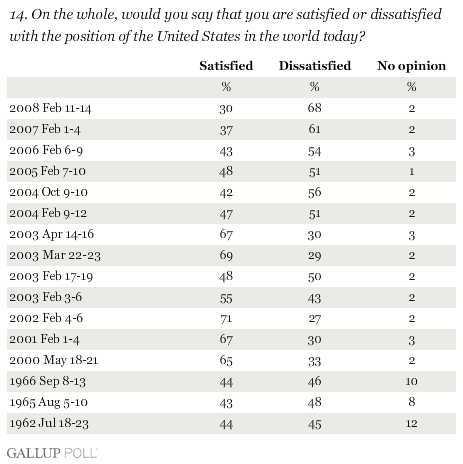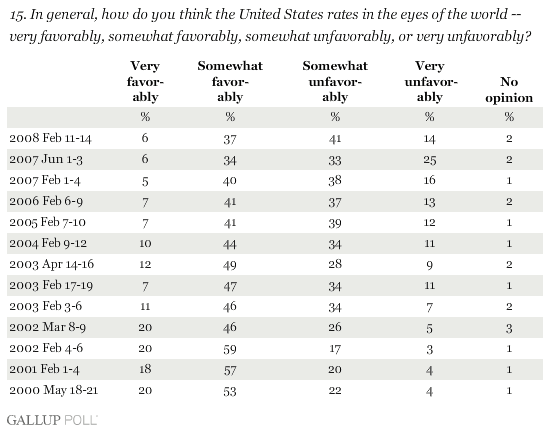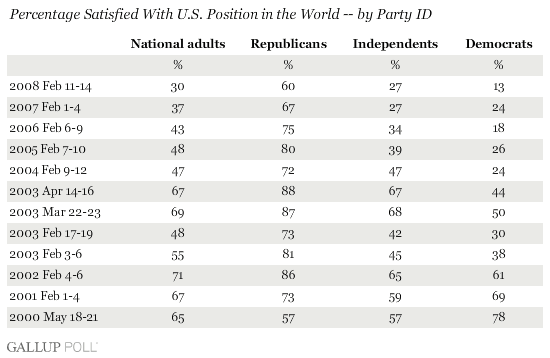PRINCETON, NJ -- Americans' view of the United States' position in the world has undergone a complete reversal over the course of the Bush administration. Since February 2001, Americans' dissatisfaction with the country's position in the world has more than doubled.
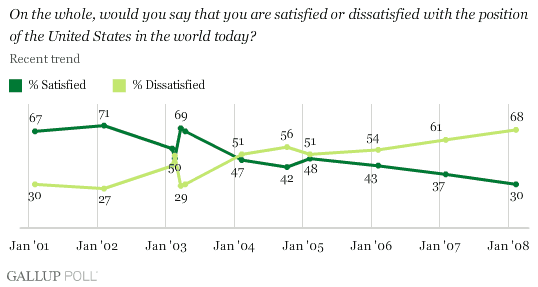
Public dissatisfaction with the United States' global position was 27% in February 2002, shortly after the 9/11 terrorist attacks. It rose to 50% during the pre-Iraq war period in 2003 when the United States was actively lobbying its allies and other countries at the United Nations to support military action against Iraq. It then quickly dipped to 29% at the very beginning of the war in Iraq in March 2003, but has risen steadily since.
Today's 68% dissatisfaction rating is the highest Gallup has recorded on this question, including during the Vietnam War era. At three different points in the 1960s, the public was consistently divided in its responses, with about 44% satisfied and 46% dissatisfied. (See table at the end of this report for exact survey dates and results.)
Diminished Perceptions of U.S. Global Image
A separate indicator of Americans' confidence in the United States' global image -- public perceptions of how the rest of the world views the United States -- follows the same path.
The percentage of Americans saying the United States rates favorably in the eyes of the world has declined from 75% in February 2001 to 43% today. Gallup trends document a steady decline in this positive sentiment from the post-9/11 period onward, broken only temporarily by a slight rebound shortly after U.S. forces invaded Baghdad near the start of the Iraq war.
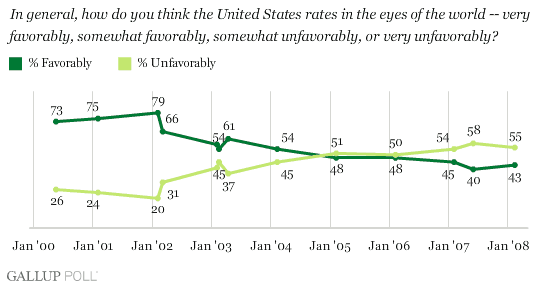
Current attitudes about the United States' global position are highly partisan, with a majority of Republicans (60%) saying they are satisfied with the country's position in the world, and the vast majority of Democrats (85%) saying they are dissatisfied. The ratings of political independents tend to be closer to Democrats' ratings than to those of Republicans.
Although the question is implicitly an evaluation of the nation's leadership, Gallup did not find a similarly strong partisan breach at the end of President Bill Clinton's second term. In May 2000, 78% of Democrats were satisfied with the United States' position in the world, along with 57% of Republicans.
The majority of Democrats were satisfied with the U.S. global position in the first two measures of Bush's presidency -- 69% in February 2001 and 61% in February 2002. However, their satisfaction plunged to 30% by February 2003, rebounded to 50% during the start of the Iraq war, and, beginning in 2004, has not registered more than 26%.
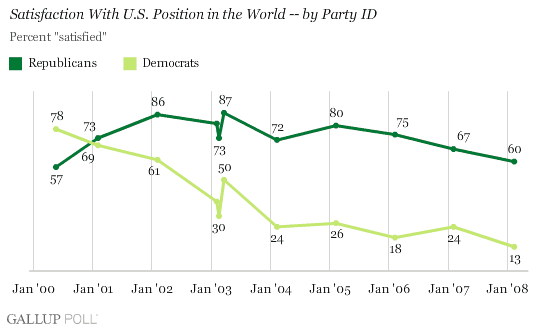
The percentage of Democrats currently satisfied on this measure (13%) is similar to what it was two years ago (18%). At the same time, satisfaction among Republicans has dropped by 15 percentage points, from 75% to 60%.
Survey Methods
Results are based on telephone interviews with 1,007 national adults, aged 18 and older, conducted Feb. 11-14, 2008. For results based on the total sample of national adults, one can say with 95% confidence that the maximum margin of sampling error is ±3 percentage points.
Interviews are conducted with respondents on land-line telephones (for respondents with a land-line telephone) and cellular phones (for respondents who are cell-phone only).
In addition to sampling error, question wording and practical difficulties in conducting surveys can introduce error or bias into the findings of public opinion polls.
